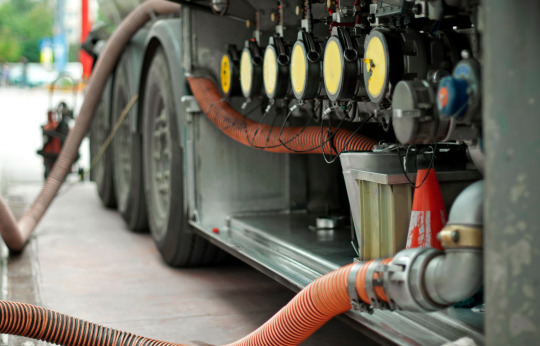#fuel management
Text
Driving Efficiency: Fleet Management Software Solutions in Dubai
In the heart of the bustling metropolis of Dubai, where every minute counts and precision is paramount, efficient fleet management is crucial for businesses to stay ahead of the curve. From logistics companies navigating the city's intricate road network to construction firms overseeing a fleet of heavy machinery, the ability to monitor, track, and optimize fleet operations can make all the difference. This is where fleet management software solutions in Dubai come into play, offering innovative tools to streamline processes, enhance productivity, and drive business growth. Let's explore some of the top fleet management software solutions making waves in Dubai's dynamic business landscape.
1. Trinetra
Trinetra is a leading provider of fleet management software solutions, offering a comprehensive suite of tools to help businesses optimize their fleet operations. With features such as real-time tracking, route optimization, and driver behavior monitoring, Trinetra empowers businesses to improve efficiency, reduce costs, and enhance customer satisfaction. Whether it's managing a fleet of delivery vehicles or a construction fleet, Trinetra's customizable solutions cater to a wide range of industries and business needs.
2. Chekhra Business Solutions
Chekhra Business Solutions specializes in fleet management software tailored to the unique requirements of businesses in Dubai and the wider UAE. Their user-friendly platform offers advanced features such as GPS tracking, fuel management, and maintenance scheduling, allowing businesses to gain real-time insights into their fleet operations. With a focus on innovation and customer satisfaction, Chekhra Business Solutions is committed to helping businesses maximize their productivity and profitability.
3. Carmine
Carmine is a cloud-based fleet management software solution designed to meet the needs of businesses of all sizes in Dubai. With features such as vehicle tracking, driver management, and compliance monitoring, Carmine helps businesses streamline their operations and ensure regulatory compliance. Its intuitive interface and customizable reporting tools make it easy for businesses to track their fleet performance and make data-driven decisions to optimize efficiency and reduce costs.
4. Fleet Complete
Fleet Complete is a global leader in fleet management software solutions, with a strong presence in Dubai and the UAE. Their comprehensive platform offers a wide range of features, including GPS tracking, route optimization, and asset management, enabling businesses to maximize the efficiency of their fleet operations. With real-time visibility into vehicle location, status, and performance, Fleet Complete empowers businesses to improve productivity, reduce fuel consumption, and enhance customer service.
5. GPSit
GPSit is a trusted provider of fleet management software solutions, offering cutting-edge technology to businesses across Dubai and the UAE. Their platform provides real-time tracking, route optimization, and driver behavior monitoring, helping businesses optimize their fleet operations and improve overall efficiency. With a focus on reliability, scalability, and customer support, GPSit is committed to helping businesses achieve their fleet management goals and drive success in a competitive marketplace.
Conclusion
In the fast-paced business environment of Dubai, where efficiency and productivity are paramount, the adoption of fleet management software solutions is essential for businesses to stay competitive and thrive. Whether it's optimizing routes, improving fuel efficiency, or ensuring regulatory compliance, these software solutions offer a comprehensive suite of tools to help businesses streamline their operations and drive growth. By harnessing the power of technology and innovation, businesses in Dubai can unlock new opportunities for success and maintain their position as leaders in their respective industries.
#In the heart of the bustling metropolis of Dubai#where every minute counts and precision is paramount#efficient fleet management is crucial for businesses to stay ahead of the curve. From logistics companies navigating the city’s intricate r#the ability to monitor#track#and optimize fleet operations can make all the difference. This is where fleet management software solutions in Dubai come into play#offering innovative tools to streamline processes#enhance productivity#and drive business growth. Let’s explore some of the top fleet management software solutions making waves in Dubai’s dynamic business lands#1. Trinetra#Trinetra is a leading provider of fleet management software solutions#offering a comprehensive suite of tools to help businesses optimize their fleet operations. With features such as real-time tracking#route optimization#and driver behavior monitoring#Trinetra empowers businesses to improve efficiency#reduce costs#and enhance customer satisfaction. Whether it’s managing a fleet of delivery vehicles or a construction fleet#Trinetra’s customizable solutions cater to a wide range of industries and business needs.#2. Chekhra Business Solutions#Chekhra Business Solutions specializes in fleet management software tailored to the unique requirements of businesses in Dubai and the wide#fuel management#and maintenance scheduling#allowing businesses to gain real-time insights into their fleet operations. With a focus on innovation and customer satisfaction#Chekhra Business Solutions is committed to helping businesses maximize their productivity and profitability.#3. Carmine#Carmine is a cloud-based fleet management software solution designed to meet the needs of businesses of all sizes in Dubai. With features s#driver management#and compliance monitoring#Carmine helps businesses streamline their operations and ensure regulatory compliance. Its intuitive interface and customizable reporting t#4. Fleet Complete
0 notes
Text
Why Every Business Needs a Fuel Monitoring System in 2023

In today's fast-paced business world, staying ahead of the competition requires a combination of innovation and efficiency. One often underestimated aspect of operational efficiency is fuel management. Whether you operate a fleet of vehicles or rely on company cars, fuel is a substantial expense that can significantly impact your bottom line.
In 2023, businesses have more reason than ever to consider adopting a Fuel Monitoring System, a technology that offers a multitude of benefits, including cost savings, improved accuracy, and enhanced security.
The Fuel Monitoring System Advantage
1. Fuel Efficiency at Its Best
One of the most compelling reasons for businesses to invest in a Fuel Monitoring System is the potential for improved fuel efficiency. With fuel prices constantly fluctuating and environmental concerns on the rise, optimizing fuel consumption has become imperative. A Fuel Monitoring System provides real-time data on fuel usage, helping businesses identify inefficiencies and implement measures to reduce waste.
For example, if your business operates a fleet of delivery trucks, you can use the system to track fuel consumption on each vehicle. By analyzing the data, you might discover that certain routes or drivers are less fuel-efficient. Armed with this information, you can make necessary adjustments to increase efficiency and decrease fuel costs.
2. Precision Fuel Tracking
Fuel Tracking Systems are renowned for their accuracy. Unlike manual record-keeping, which can be prone to errors and inaccuracies, these systems provide precise measurements of fuel consumption. This level of accuracy simplifies budgeting and financial planning, as you can rely on the data generated by the system with confidence.
Imagine the financial advantages of being able to account for every drop of fuel used across your fleet. It enables you to create more precise budgets, identify trends in fuel consumption, and plan for fluctuations in fuel prices with greater accuracy.
3. Tailored Solutions for Trucks and Vehicles
Fuel Monitoring Systems are versatile and can be tailored to meet the specific needs of your business. Whether you manage a fleet of trucks, company cars, or a combination of both, these systems can be adapted to suit your requirements. This adaptability ensures that you can monitor and manage fuel effectively, regardless of the vehicles in your fleet.
For businesses in the trucking industry, Fuel Monitoring Systems for Trucks can provide specialized solutions that consider factors such as engine type, route length, and cargo weight. These systems offer insights that go beyond basic fuel tracking, helping you optimize every aspect of your trucking operations.
4. Preventing Fuel Theft
Fuel theft is a prevalent issue for many businesses, especially those with a large fleet of vehicles. Unauthorized access to fuel can lead to significant financial losses over time. Fortunately, many Fuel Monitoring Systems come equipped with anti-theft features to safeguard your fuel supply.
These systems can detect unusual fuel consumption patterns or sudden drops in fuel levels, which may indicate theft or unauthorized use. Real-time alerts and detailed data allow you to pinpoint suspicious activity and take swift action to prevent further losses. By deterring fuel theft, you protect your assets and reduce expenses associated with unauthorized fuel consumption.
5. Seamless Integration with GPS
Many modern Fuel Monitoring Systems offer seamless integration with GPS technology. This integration provides a holistic view of your operations by combining fuel consumption data with real-time information on vehicle locations, routes, and driver behavior. The benefits of this integration extend beyond fuel management and can lead to substantial cost savings and productivity improvements.
For example, GPS integration allows you to monitor driver behavior, such as speeding or excessive idling, which can negatively impact fuel efficiency. By identifying these issues, you can provide targeted training or coaching to drivers, ultimately reducing fuel costs and minimizing wear and tear on vehicles.
Additionally, GPS tracking can help you optimize routes for your fleet, reducing unnecessary mileage and further improving fuel efficiency. It also enables you to provide accurate delivery or service arrival times to customers, enhancing overall customer satisfaction.
As we step into 2023, it is clear that a Diesel Monitoring System is no longer a luxury but a necessity for businesses looking to thrive in a competitive and environmentally conscious environment. The advantages it offers in terms of fuel efficiency, precision tracking, and theft prevention are invaluable. By implementing a Fuel Monitoring System, you gain the tools to make your business more cost-effective, environmentally friendly, and competitive.
With the rising costs of fuel and growing concerns about sustainability, there has never been a better time to invest in this technology. Don't miss out on the opportunity to stay ahead of the competition and optimize your fuel management. Consider implementing a Fuel Monitoring System in your business today, and watch your operations flourish in the year ahead. The benefits are substantial, and the potential for long-term cost savings and efficiency improvements is undeniable.
#fleet management#fuel monitoring system#b2b services#technology#saas#fuel efficiency#fuel management#telematics
0 notes
Text
Real-Time Insights: The Power of Data Analytics in Container Tracking
Did you know that approximately 90% of the world’s trade is carried out through sea transport? With millions of containers being shipped across oceans every day, the logistics industry faces a monumental challenge in ensuring timely and efficient delivery. Real-time insights and data analytics have revolutionized container tracking like never before. By harnessing the power of big data, companies can now monitor their cargo with unprecedented accuracy and optimize supply chain operations for maximum efficiency.
In this blog post, we will delve into the realm of real-time insights in container tracking, exploring how data analytics has transformed this crucial aspect of global trade and uncovering its immense potential to reshape the future of logistics worldwide.
Eagle-IoT Container Tracking Solution provides real-time information about the location and status of containers. With live tracking updates, potential delays can be identified early on. By leveraging the power of live tracking updates and historical data, stakeholders can optimize their supply chain processes, improve efficiency, and enhance customer satisfaction. Eagle-IoT Container Tracking Solution provides the following insights:
Track the whereabouts of lost containers.
Eliminate blind spots and safeguard cargo.
Keep track of unauthorized access, tampering, or unscheduled loading/unloading with dual-mode connectivity.
Prevent spoilage claims with alarms and remote temperature control features.
Prevent the risks to drivers and cargo from cellular network jammers
Read More: https://avl-ksa.com/en/real-time-insights-the-power-of-data-analytics-in-container-tracking/
#fleet maintenance#fleet management#tracking software#fleet maintenance services#fuel management#internet of things#iotsolutions
0 notes
Text
Fuel Management Unleashed: Unlocking Efficiency, Savings, and Tracking
Introduction
In the quest for a greener and more cost-effective future, fuel management has emerged as a crucial aspect of responsible driving and fleet operations. Whether you're an individual seeking to optimize fuel consumption or a business owner striving to maximize efficiency, mastering fuel management techniques can lead to significant benefits. In this blog, we'll delve into the essential strategies for saving fuel, enhancing efficiency, and implementing effective tracking methods to pave the way for a more sustainable and economically viable approach to fuel usage.
Fuel Saving Strategies: Empowering Your Drive
a. Vehicle Maintenance: Regular maintenance is the foundation of fuel efficiency. Keep your engine in top condition, replace air filters, and maintain proper tire pressure to reap considerable fuel savings.
b. Smooth Driving Habits: Vigorous driving habits are not only unsafe but also lead to higher fuel consumption. Embrace a smooth driving style, with gradual accelerations and gentle braking, to optimize fuel efficiency.
c. Reduce Idle Time: Unnecessary idling burns fuel without any purpose. Minimize idle time by turning off the engine during prolonged stops, contributing to both fuel and cost savings.
d. Carpooling and Public Transport: Embrace eco-friendly commuting options such as carpooling and public transportation to reduce the number of vehicles on the road, curbing fuel usage and easing traffic congestion.
Fuel Efficiency Techniques: Navigating the Road to Excellence
a. Optimal Route Planning: Strategically plan your routes to minimize distance and avoid congested roads. Utilize navigation apps with real-time traffic updates to find the most fuel-efficient paths.
b. Considering Aerodynamics: Fleet managers can boost fuel efficiency by selecting vehicles with improved aerodynamics and eliminating unnecessary roof racks and equipment, reducing drag and conserving fuel.
c. Embracing Technology: Harness the power of cutting-edge vehicle technologies, such as hybrid and electric vehicles, to achieve sustainable fuel savings and reduce environmental impact.
Implementing Fuel Tracking Mechanisms: Steering Toward Success
a. Fuel Cards and Software: Streamline fuel expense tracking for businesses with multiple vehicles using fuel cards and management software, enabling better financial control and insightful data analysis.
b. Telematics Systems: Make informed decisions with real-time vehicle performance, driver behavior, and fuel usage data provided by telematics systems, enhancing fleet efficiency.
c. Fuel Efficiency Apps: Empower individual drivers with mobile apps that track fuel consumption, calculate fuel costs, and offer valuable performance analytics, fostering responsible driving habits.
Conclusion
Fuel management is no longer a choice but an imperative in our pursuit of a sustainable future. By adopting fuel-saving strategies, optimizing efficiency, and leveraging effective tracking mechanisms, we can drive meaningful change in our transportation practices.
Whether you're a daily commuter or a fleet manager, fuel management unlocks a world of possibilities, combining financial savings with environmental responsibility. Together, let's unleash the power of fuel management, steering towards a future of efficiency, savings, and reduced carbon footprint. Embrace these strategies and make every journey a step closer to a brighter and more sustainable tomorrow.
0 notes
Text
0 notes
Text
Are Fuel Monitoring Systems Required for Australian Trucks?
Fuel monitoring systems are a critical component of the trucking industry, designed to accurately measure fuel consumption and detect any potential fuel theft or inefficiencies in the system. These systems use a range of technologies, such as sensors and GPS tracking, to monitor fuel levels in real-time, providing accurate data on fuel consumption, mileage, and driver behaviour.
The importance of fuel monitoring systems in the trucking industry cannot be overstated. Fuel is one of the largest expenses for trucking companies, and any inaccuracies or inefficiencies in the fuel system can have a significant impact on a company's bottom line. Fuel monitoring systems help companies to reduce fuel costs, increase fuel efficiency, and improve overall fleet management. These systems also play a vital role in reducing the carbon footprint of the trucking industry, by promoting more efficient and sustainable fuel consumption practices.

The purpose of this article is to explore the current state of fuel monitoring systems for trucks in Australia and to answer the question of whether these systems are mandatory or optional. The article will discuss the laws and regulations surrounding fuel monitoring systems in Australia, the benefits and drawbacks of mandatory and optional systems, and best practices for fuel monitoring system implementation. By the end of the article, readers will have a better understanding of the importance of fuel monitoring systems in the trucking industry and the options available to them for implementing these systems in their businesses.
The Current State of Fuel Monitoring Systems in Australia
In Australia, the regulations and laws surrounding fuel monitoring systems are complex and depend on the type and size of the vehicle being used. For example, vehicles with a gross vehicle mass (GVM) of over 4.5 tonnes are required to comply with the Heavy Vehicle National Law (HVNL), which mandates the use of on-board mass (OBM) systems. These systems monitor the vehicle's weight, including fuel levels, to ensure that they do not exceed legal weight limits.
In addition to the HVNL, the Australian Taxation Office (ATO) requires all businesses that use fuel for their operations to maintain accurate records of their fuel use and report this information on their tax returns. This requirement applies to all businesses, including those that do not use heavy vehicles.
Compared to other countries, Australia's fuel monitoring systems are considered to be relatively advanced, with many companies using GPS tracking and telematics systems to monitor fuel consumption in real-time. However, there is still room for improvement, particularly in the areas of data analysis and reporting.
Fuel monitoring systems are an essential tool for fleet management in Australia's trucking industry. While the regulations and laws surrounding these systems are complex, they are designed to promote safety and reduce the environmental impact of the industry. Compared to other countries, Australia's fuel monitoring systems are relatively advanced but there is still room for improvement in data analysis and reporting.
Mandatory Fuel Monitoring Systems in Australia
In Australia, the use of mandatory fuel monitoring systems is primarily governed by the Heavy Vehicle National Law (HVNL). The law requires all heavy vehicles over 4.5 tonnes GVM to be fitted with an approved electronic system that can record the vehicle's distance, speed, and fuel consumption. The system must also be tamper-proof and capable of generating reports that can be used to monitor driver behaviour and fuel consumption.
The benefits of mandatory fuel monitoring systems are significant, particularly for fleet operators. These systems provide accurate and reliable data on fuel consumption, allowing companies to identify inefficiencies and reduce fuel costs. They also help to improve driver behaviour by providing feedback on speeding, harsh braking, and idling, leading to safer driving practices and reduced wear and tear on vehicles.
Despite the benefits of mandatory fuel monitoring systems, there are some reasons why operators may be hesitant to install them. The upfront costs associated with purchasing and installing these systems can be significant, which may be a concern for smaller operators with limited budgets. Additionally, the ongoing maintenance and monitoring of the system can require additional resources and administrative workload. There is also a risk of false alarms or errors, which can further add to the workload and require additional attention.
Mandatory fuel monitoring systems are required for heavy vehicles in Australia and provide numerous benefits to fleet operators, including improved fuel efficiency and driver behaviour. While there are some drawbacks to these systems, several companies in Australia have successfully implemented them to comply with regulations and improve their operations.

Optional Fuel Monitoring Systems in Australia
Optional fuel monitoring systems are an increasingly popular tool for companies looking to manage their fuel consumption and costs. These systems allow companies to track fuel usage in their vehicles and identify inefficiencies or areas for improvement.
One of the most significant benefits of fuel monitoring systems is cost savings. By identifying areas where fuel consumption can be reduced, companies can save money on their fuel expenses. This can be particularly important for companies that operate a large fleet of vehicles, where even small improvements in fuel efficiency can add up to significant cost savings over time.
Another benefit of fuel monitoring systems is increased accountability. These systems provide data that can be used to hold drivers accountable for their fuel usage and ensure that they are following company policies. This can help reduce fuel waste and prevent drivers from engaging in unsafe or inefficient driving practices.
Fuel monitoring systems can also help improve safety by identifying potential issues before they become serious problems. For example, a fuel monitoring system may detect a fuel leak or an issue with a vehicle's fuel system, allowing the company to address the issue before it causes an accident.
There are also environmental benefits to implementing a fuel monitoring system. By reducing fuel consumption, companies can decrease their greenhouse gas emissions and contribute to a more sustainable future. This can be particularly important for companies that are committed to reducing their environmental impact and meeting sustainability goals.
Fuel monitoring systems can be a valuable tool for companies looking to manage their fuel consumption and costs. By identifying areas for improvement and holding drivers accountable, companies can reduce fuel waste, improve safety, and contribute to a more sustainable future. However, companies must carefully consider the costs and potential drawbacks of implementing a fuel monitoring system before making a decision.
Best Practices for Fuel Monitoring Systems in Australia
Fuel monitoring systems are crucial tools for businesses in Australia that rely heavily on fuel, such as transportation, logistics, mining, and agriculture. These systems help to monitor fuel usage, detect leaks, and prevent fuel theft, thereby reducing operating costs and increasing efficiency. However, selecting and implementing the right fuel monitoring system can be a challenging task. In this article, we will discuss some tips for selecting the right fuel monitoring system for your business, an overview of best practices for fuel monitoring system implementation, and some case studies of companies that have successfully implemented fuel monitoring systems.
When selecting a fuel monitoring system, it is essential to consider the type of fuel used, the size and location of the fuel storage tanks, and the number of vehicles or equipment that will be monitored. It is also crucial to consider the features of the fuel monitoring system, such as real-time data monitoring, automatic data logging, and remote access. Additionally, the system should be easy to install, operate, and maintain.

The implementation of a fuel monitoring system should follow some best practices to ensure that it delivers the desired results. Firstly, it is essential to set clear objectives and performance indicators to measure the system's effectiveness. Secondly, it is crucial to train employees on how to use the system and interpret the data generated by the system. Thirdly, it is essential to regularly maintain and calibrate the system to ensure its accuracy and reliability. Finally, it is vital to ensure that the system complies with relevant Australian regulations and standards, such as those set by the Australian Petroleum Statistics Reporting.
While it may not be mandatory for trucks in Australia to have fuel monitoring systems installed, it is highly recommended. Implementing a fuel monitoring system can help businesses reduce fuel costs, prevent fuel theft, and monitor fuel usage to improve efficiency. Banlaw is a leading provider of fuel management solutions in Australia and can assist you in selecting and implementing the right fuel monitoring system for your business. Contact Banlaw today to learn more about their range of fuel management products and services and how they can help your business achieve optimal fuel efficiency.
0 notes
Link
A fleet management system, which includes hardware, software and service, has the ability to make decisions for fleet managers and fleet businesses easily. The effects of COVID-19 and Ukraine and Russia conflict on different industries have resulted in drastic changes in energy prices.
The increasing demand for commercial vehicles from the transportation and logistics sector is expected to propel the global fleet management market substantially.
To know more regarding the fleet management system, get recent published sample report at: https://bisresearch.com/requestsample?id=1444&type=download
#Fleet Management Software#fleet management system#fleet management#fleet services#ari fleet management#fleetmanager#Real-Time Location Monitoring#Fuel Management#Driver Management#Light Commercial Vehicles#Heavy Commercial Vehicles#IoT Module#SIM#Sensors
1 note
·
View note
Link
We are one of the best destinations to offer the GPS installation service so that anyone cannot be compelled to lose their loved one. Leaving the life concern of your loved one to one side, we offer this service to find out the lost item.
0 notes
Text

Come on down to Mama K’s, the best steak house this side of Baldur’s Gate!
#my drawing of gale using Karlach as a grill had me thinking#what if once karlach manages to fix her engine post game she opens up a steak house/pub in the Gate#wouldn’t that be neat :]#also that bbq sauce Has been used as explosive fuel before. that’s how spicy it is#bg3#karlach bg3#karlach cliffgate#karlach#baldurs gate 3#my art#fan art
604 notes
·
View notes
Text
Fleet Management Software - Mohanta Infotech

Manage your construction project anytime from anywhere with our cloud based automation system.
Book a free online consultation today!
Call/ Whatsapp: 9937937489
Web: www.mohantainfotech.com
1 note
·
View note
Text
10 ways to manage fuel costs
The cost of fuel can be high but there are ways you can use for effective fleet fuel management to lower fuel costs. A fleet fuel management system is great for monitoring trucking fuel efficiency but may not take into account all of the variables that impact fuel costs. Here are some tips for fuel management.
Reduce average speed & set speed restrictions
Speeding is also the leading cause of increased fuel consumption. Driving slower and setting speed restrictions for drivers can significantly reduce fuel expenses.
Avoid aggressive driving
Hard braking and excessive acceleration increase fuel consumption and costs.
Reduce unnecessary idling
Idling requires about a gallon of fuel per hour. If a driver idles eight hours a day, this costs about $120 per week.
Regular maintenance
Keeping vehicles properly maintained maximizes fuel efficiency.
Be cautious of specs
Always consider weight and maintenance when selecting or modifying a truck.
Take advantage of fuel programs
Fuel discount programs and fuel cards for truckers guarantee savings on every trip to the pump. Triumph Business Capital offers many fuel card benefits to help your company to save money.
Trucking fuel efficiency
To read more about our fuel program and fleet fuel management system, contact us today!
#Fleet fuel management#Fuel management#Fuel card benefits#Fleet fuel management system#Trucking fuel efficiency#Fuel discount programs
1 note
·
View note
Text
Driving Efficiency: The Evolution of Fuel Management system in Dubai
In a city like Dubai, where logistics and transportation play a pivotal role in everyday operations, efficient fuel management is of paramount importance. The proper monitoring and optimization of fuel usage can lead to significant cost savings, reduced environmental impact, and enhanced operational efficiency. To achieve this, many companies in Dubai are turning to advanced fuel management systems. This blog post will explore how fuel management systems in Dubai are streamlining fuel management and the benefits they offer.
Real-Time Monitoring: One of the primary features of fuel management systems is real-time monitoring. These systems use GPS and other advanced technologies to track fuel levels in vehicles and equipment. Managers can access this information remotely through a web-based interface or mobile app, enabling them to keep an eye on fuel consumption in real-time.
Accurate Reporting and Analysis: Fuel management systems generate detailed reports and analytics based on fuel usage data. These reports provide insights into fuel consumption patterns, driver behavior, and equipment efficiency. With this information, companies can identify areas for improvement and make data-driven decisions to optimize fuel usage.
Preventive Maintenance: Fuel management systems can also monitor engine performance and identify potential maintenance issues before they become significant problems. By detecting issues early, companies can reduce the risk of costly breakdowns and prolong the lifespan of their vehicles and equipment.
Enhanced Security: Fuel theft is a common problem in the transportation industry, but fuel management systems help mitigate this risk. These systems can track fuel transactions and identify anomalies, such as fuel being dispensed after hours or at unauthorized locations. This helps deter theft and improve overall security.
Environmental Benefits: By optimizing fuel usage and reducing wastage, fuel management systems contribute to a reduction in carbon emissions and other pollutants. This aligns with Dubai’s commitment to sustainability and environmental responsibility.
Conclusion: Fuel management systems are revolutionizing the way companies in Dubai manage their fuel resources. By providing real-time monitoring, accurate reporting, and preventive maintenance capabilities, these systems help companies reduce costs, improve efficiency, and contribute to a more sustainable future. As the demand for efficient fuel management continues to grow, it’s clear that fuel management systems will play an increasingly important role in Dubai’s transportation industry.
#Fuel Management#GPS fleet Tracking Software uae#GPS Tracking#Preventive Maintenance#Transportation Technology
0 notes
Text
The Evolution of Fuel Level Sensor Technology: From Mechanical to Digital

The automotive industry has witnessed remarkable advancements in technology over the years, and one area that has significantly evolved is fuel level sensor technology. From simple mechanical devices to sophisticated digital sensors, the journey of fuel level measurement has come a long way.
In this blog post, we'll explore the fascinating evolution of fuel level sensor technology and the impact it has had on modern vehicles and fuel management.
The Early Mechanical Fuel Gauges
In the early days of automobiles, fuel level measurement was rudimentary. Most vehicles were equipped with mechanical fuel gauges that relied on a float mechanism inside the fuel tank. As the fuel level changed, the float would move, which in turn moved a needle on the dashboard gauge. While functional, these systems had limitations in accuracy and reliability.
Introduction of Electric Fuel Gauges
Electric fuel gauges, a significant improvement over mechanical ones, started to emerge in the mid-20th century. These gauges used electrical resistance to measure fuel levels. A variable resistor in the fuel tank sensor sent electrical signals to the gauge, which then displayed the fuel level on the dashboard. This technology provided more accurate readings and became the standard for several decades.
Digital Fuel Level Sensors
The digital era marked a revolutionary shift in fuel sensor technology. Digital fuel level sensors employ advanced electronics and sensors to provide precise and real-time fuel level data. Unlike their predecessors, digital sensors are highly accurate and less susceptible to wear and tear. They can also communicate with onboard computers, enabling more sophisticated fuel management systems.
Types of Digital Fuel Level Sensors
1. Ultrasonic Sensors:
Ultrasonic fuel level sensors use ultrasonic waves to measure the distance between the sensor and the fuel surface. This technology is highly accurate and is commonly used in modern vehicles and industrial applications.
2. Capacitive Sensors:
Capacitive fuel level sensors rely on changes in capacitance to detect fuel levels. They are known for their reliability and ability to operate in challenging environments.
3. Resistor-Based Sensors:
Some digital fuel level sensors still use resistive elements but have been greatly improved for accuracy and longevity. They are cost-effective and suitable for various applications.
Benefits of Digital Fuel Level Sensors
Accuracy: Digital sensors offer precise and consistent fuel level readings, reducing the likelihood of inaccurate readings and fuel-related issues.
Real-time Monitoring: These sensors provide real-time data, allowing drivers and fleet managers to make informed decisions about refueling and fuel efficiency.
Improved Fuel Management: Digital sensors enable more sophisticated fuel management systems, optimizing fuel consumption and reducing costs for businesses.
Reduced Maintenance: With fewer moving parts, digital sensors require less maintenance and are more durable compared to mechanical counterparts.
Conclusion
The evolution of fuel level sensor for gps tracking technology from mechanical to digital has brought about significant improvements in accuracy, reliability, and functionality. These advancements have not only benefited individual vehicle owners but have also revolutionized fuel management for businesses with large fleets.
As technology continues to advance, we can expect even more innovative solutions to emerge, further enhancing fuel efficiency and reducing environmental impact in the automotive industry.
#fleet management#fuel monitoring system#transportation#b2b services#saas#fleet#fuel efficiency#fuel management#telematics
0 notes
Text
Maximize Your Fleet’s Efficiency with Fuel Monitoring: Start Saving Today!
The fuel efficiency of a fleet represents the competency of fleet management. To ensure the optimal performance of your fleet, it is worthwhile to invest in both time and resources. In addition to offering insight into fuel usage, fuel monitoring solution also helps you in reducing the environmental effect of your fleet by providing you an insight into your fleet’s carbon emission, making your fleet operation more efficient and environmentally friendly. To analyze the fuel efficiency of your fleet, it is important to consider both fleet performance and driver behavior. Adopting good driving habits, performing regular maintenance, and making necessary modifications can help not only streamline fleet operations but also improves the bottom line.
To read more of fuel monitoring solutions in saudi
0 notes
Text
Mastering Fuel Management: Top Strategies for Fuel Saving, Efficiency, and Tracking
In this blog, we’ll explore the top strategies for fuel management, offering insights to help you save money, reduce emissions, and make more informed decisions.
0 notes
Text
How to Reduce Fleet Fuel Costs Using Fuel Management System
1 note
·
View note